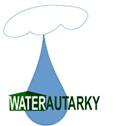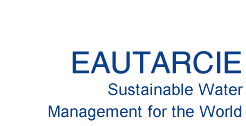
*In French, ‘EAU' means water, ‘AUTARCIE' means AUTARKY, or a self-sufficient system independent of outside influences: EAUTARCIE, [pronounced « Oh-tar-see »] is therefore a neologism...
The EAUTARCIE concept is one of the possible forms of ecological sanitation with a distinct feature : instead of focusing on the problems, it seeks out simple, efficient and economical solutions, at the root of the problems. Another feature : it takes a holistic approach that examines diverse environmental impacts.
The text within this page was first published on www.eautarcie.com: in 2003
The original text has since been adapted and first published on this page at www.eautarcie.org: 2009-09-25
Last update: 2017-03-20


Ecological Water Consumption Practices
Two Visions on Water Management
Official Water Management Policy
Official policies are defined by water distribution corporations and their experts. These view water management as needing to be fully centralized and entrusted to their technicians' care. To support their stand, they invoke guaranteed water quality and safety by means of regular monitoring of distributed water supply. This involves producing potable water at high cost and using it for all household uses [1].
At best, rainwater harvesting is recommended for WC's, laundry and exterior taps, and only after disinfection. In most countries, rainwater harvesting for personal hygiene, food and drink is usually discouraged.
Even in this respect, official policy is incoherent. The public is expected to conserve water, while at the same time completely overlooking rainwater harvesting benefits. Such incoherence is rooted in the absurd legislation that taxes water consumption instead of water pollution.
The Sustainable Water Management Approach
Ecological Sanitation's sixth principle is specifically concerned with water supply for the population: adapt water quality to its end-use. We only need 3 to 5 litres of potable quality water per day per person. This water will be for drinking, coffee, tea, food preparation and cooking. For all other uses, « potable » water is absolutely not indispensable. Safe « innocuous » domestic water is perfectly adapted. And the accidental absorption of small quantities of such water does not pose a health risk. However, for uses like dishwashing, laundry or personal hygiene, naturally soft rainwater is much better than mains city water, which is often hard and calcareous.
Under this principle, it is also necessary to create a legal and regulatory framework that provides fair and equal treatment to all available water resources: mains water, springs, wells, rain. Currently, water distribution is monopolized by various public and private corporations that impose unsustainable water management policies. Thus, in total disregard of known analytical facts, rainwater harvesting is officially proclaimed as « dangerous ».
Ecological Water Consumption Practices
Current home eco-consumption practices on water address two issues: conserving water and limiting water's pollution. Yet those measures that can be taken daily by the average person have varying impacts. For instance, choosing a « green » product for one's laundry will hardly have any impact on our rivers' water quality. On the other hand, adopting a dry toilet instead of a flush toilet will have a major impact. It is not exaggerated to state that resorting to dry toilets practically eliminates the problems of domestic wastewater and the colossal expenditure involved in its treatment. In any event, small gestures repeated daily by millions of people can have a considerable impact.
If our objective is to protect the environment, legislation imposes its framework and limitations in this respect. Therefore, the impetus should be to redirect water policies and adapt legislation to encourage individual initiatives towards preventing water pollution. Current European legislation on water management goes against such initiatives. The same can be said of European member nations.
Should We Conserve Water?
Current Non-Sustainable Water Management
When the public is made aware of water problems, authorities centre their actions on water conservation. Yet this approach only makes sense in the presence of centralized management of our water resources. Once you remove the need to safeguard the existence of drinking water monopolies, and that you prioritize sustainable water management, it can easily be shown that decentralized water management begets an altogether different approach to water conservation.
First, there are many nonsensical water conservation measures promoted by municipal, communal and regional authorities, and by many citizens' associations.
Private water distribution corporations are the ones that recommend such measures, as these don't harm their sales turnover. Public corporations do the same, captive as they are of dominant views, innate or preconceived ideas, and even political interests.
In a way, current European legislation makes water conservation appear to be an uncivil gesture: the less water one consumes, the less taxes one pays to finance wastewater treatment (while all the time sending dirty water into the sewers). One thus reduces his or her participation to the collective effort on sanitation. You can even surmise that those who exclusively use harvested rainwater could end up paying no taxes for potable water.
On the other hand, common sense – and economics – dictates that we should conserve our water resources. Ultimately, it is up to each one of us to weigh up our ecological conscience against our sense of civic duty.
Recommended water conservation measures only make sense when using city water or well water, because in so doing, they help reduce demand on those water resources. When you use rainwater, and manage its use and discharge in a judicious manner (i.e. by infiltrating your wastewater into the soil after treatment), the onus differs: you are simply diverting naturally falling rainwater from your roof for your personal use, and afterwards sending it back into the soil where it should logically return, where it would have gone in the first place.
If you have a large roof for rainwater catchment, whether or not you conserve water will make no difference on your budget or on the environment. If you only have a small roof, that is when you need to conserve water so that your cistern does not go dry too quickly.
Nonsensical Water Conservation Measures
The following measures are the ones you read about in official government publications and in most of those published by ecological organizations. They have little impact on large-scale water management. They only serve to provide a clear conscience to those who refuse to go to the root of the problem.
- Shut the faucet while brushing one's teeth or while taking a shower in between scrubbings ;
- Take a shower rather than taking a bath ;
- Use a water-saving shower head ;
- Put a brick or a water bottle in the toilet's water tank, or better, buy a low-flush toilet such as a dual-flush water-closet.
More Effective Water Savings
- Repair faucet and toilet flush leaks ;
- Only do your laundry and dishwashing with full loads ;
- · Reuse your bath water to wash your exterior decks and water your garden; the idea of using residual bath water in a flush toilet’s tank is a typical example of a « make believe » solution (i.e. greenwashing).
Substantial Water Saving Measures
The following measures are not recommended by regulating authorities or by water distribution corporations, thus maintaining their fiscal revenues or sales turnover.
The preeminent measure is rainwater harvesting for whole-house reuse. On a regional scale, the water that falls on a roof (in Western Europe) represents about 80% of a household's water needs. In Europe, each m² of roof provides 500 to 1300 litres of water annually (depending on local rainfall). Readers can easily calculate their potential water savings. As an example: if your local rainfall is 800 mm/year, for a home with a measured roof (horizontally-measured) of 10 x 10 metres, with a 15-m³ cistern, than you theoretically dispose of 220 litres of rainwater daily. This is not a negligible quantity. With a good well-pump system and appropriate filtration systems, you would then dispose of good-quality freshwater – including for food and drink – if you so wish.
Another good water conservation measure is to replace the flush toilet by a biolitter toilet (BLT) in those homes situated in periurban and rural zones. This single measure can help save 25 to 30% on one's water bill. And it will help reduce environmental pollution and regenerate soils with the compost obtained. The BLT principle is even transposable to high-density housing in urban centres. Contrary to established and widespread views, one can perfectly conceive that sustainable water management in cities is not necessarily bound to the use of dry toilets.
Reducing Pollution
Water pollution is also subject to nonsensical solutions, when you consider them from a holistic point of view.
Sanitation engineers claim that the more you pollute wastewater, the better a sanitation plant will perform, i.e. with a high purification efficiency. However, this does not lead to better protection of the environment. Pollution reduction is not in the interest of corporations that manage such plants. Thence, the public is subtly encouraged to pollute in order to make these plants profitable. What sanitation specialists omit to mention is that the dirtier the water at a plant's inlet, the lesser quality water that flows out of the plant.
On the other hand, preventing pollution at its point of origin is in the environment's best interest, and also in the interest of economics. If a treatment plant's purification efficiency – imposed by law - is better with greater pollution, treated wastewater discharged by these plants will somewhat improve if everyone reduces the pollution they produce in water.
Until legislation is redirected to tax polluters rather than water, preventing or reducing pollution will remain dependent on people's good will and motivation. Go to the page on The Polluter Pays Principle for further reading.
Nonsensical Measures in Regards to Pollution
Current recommendations from government and consumer groups propound the following:
- Only do your laundry with a full load, and use the least possible detergent ;
- Use only « ecological » or « green » detergents for laundry and dishwashing ;
- Reduce your need for detergents by installing a water softener
(Comment: and what about the pollution generated by water softener salts, and the pollution that goes into their manufacturing ?)
Effective Measures for Pollution Reduction
You can go much further in this respect. In fact, it is possible for anyone to produce zero water pollution, while at the same time making substantial savings when installing a water treatment system. Albeit, legislation will impose limitations: zero pollution set-ups (such as selective grey water treatment when combined with the use of a biolitter toilet) are prohibited by law.
Such legislation constitutes a dilemma for the best motivated proponents for environmental conservation: must we comply with the law and abandon the most efficient and environmentally-friendly techniques? In reality, laws prevent the most conscientious citizens from not polluting water.
Whole-house reuse of rainwater reduces water pollution. Rainwater's natural mildness helps reduce the quantity of detergent, soap, dishwashing liquid, etc. When rainwater is called upon to replace hard water, the quantities can be reduced by as much as 80%. At the same time, water softening systems are no longer needed, meaning savings on their purchase and operation, and prevention of potential salt pollution. The lifecycles of laundering and dishwashing appliances as well as household faucets are also extended: less frequent replacement = less pollution.
Laundering and the Environment
We have shown that harvesting rainwater helps reduce pollution. You can go even further by including notions of bodily cleanliness and washed clothes. There's no mistaking it: the more you wash your clothes, the more you pollute water. Certain levels of cleanliness have important environmental impacts.
Our obsessive fear of microbes and dirt has seriously misdirected us, at the expense of our rivers. The pharmaceutical and detergent industries maintain this phobia by conducting very effective publicity campaigns. Pollution is obviously not their concern, all the more that another industry profits from pollution by treating wastewater.
By applying simple straightforward measures, we can greatly help prevent pollution of our rivers. Each must find a just middle-ground in order to best protect the environment as well as one's health and well-being, between untidiness and obsessive cleanliness.
Pollution and Drinking Water
Making the right choices for your drinking water also helps prevent pollution. Buying plastic-bottled mineral or spring water generates plastic bottle garbage in the environment. Buying bottled water in refundable bottles isn't a solution either, although you may feel it gives you a clear conscience.
The least expensive solution, which best protects a family’s health as well as the the environment is described in an article titled High Quality Water for the Home on the Documentation Downloads page.




